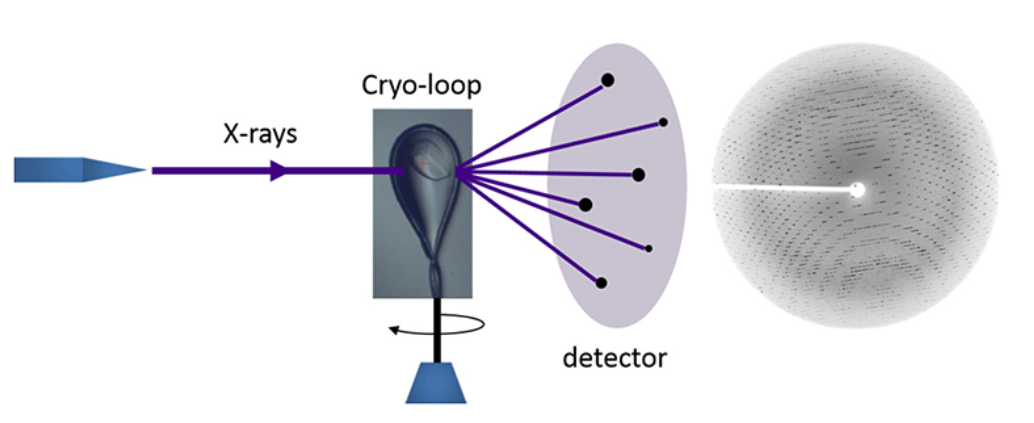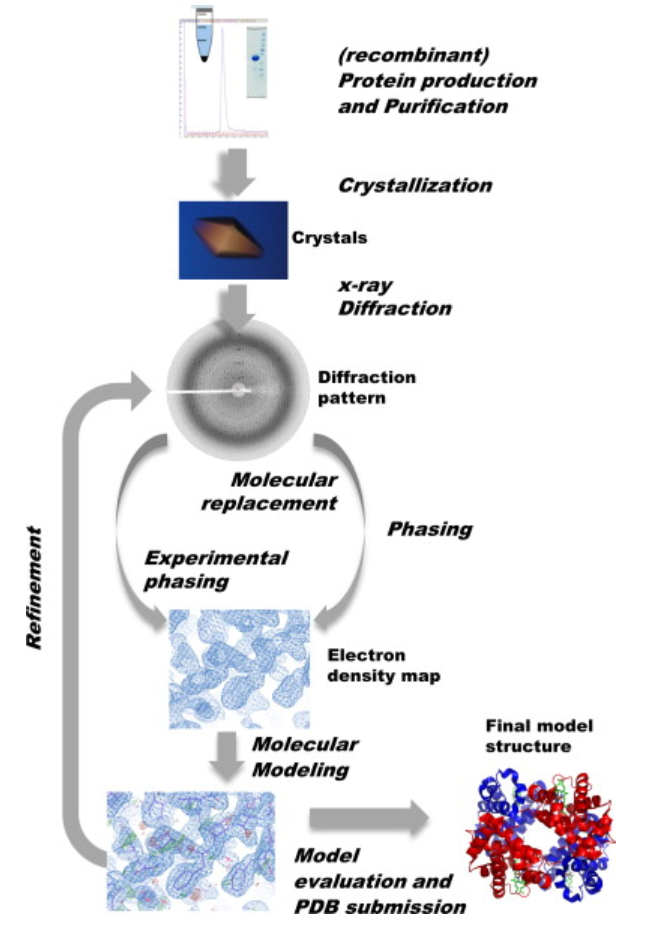Crystallography Analysis Service
- Protein structure determination
- Antibody and biologics development
- Enzyme mechanism studies
- Protein engineering and design
- Analysis of protein-ligand interactions
- Biopharmaceutical quality control
Crystallography analysis is a highly precise structural biology technique used to determine the three-dimensional atomic structure of biomolecules, such as proteins, nucleic acids, and protein-ligand complexes. The crystallography analysis method involves growing high-quality crystals of the target molecule, exposing them to an X-ray beam, and analyzing the resulting diffraction patterns. These patterns are mathematically interpreted to build an atomic-resolution model of the molecule, revealing intricate details of its structure, including active sites, folding patterns, and interaction interfaces. As one of the most powerful tools in structural biology, crystallography analysis provides unparalleled insights into the architecture and function of complex biological systems.

Figure 1. Principle of Crystallography Analysis
The applications of this technology span multiple critical areas. In drug discovery and design, crystallography analysis enables researchers to visualize drug-binding sites, facilitating the rational design of more effective therapeutics. In protein engineering, crystallography analysis helps identify structural weaknesses and optimize protein stability. Furthermore, crystallography analysis plays a vital role in biopharmaceutical development, supporting the characterization of monoclonal antibodies, vaccines, and enzyme mechanisms, ensuring their efficacy and safety in therapeutic applications.
Service at MtoZ Biolabs
MtoZ Biolabs offers a comprehensive Crystallography Analysis Service designed to provide cutting-edge solutions for structural biology challenges. By integrating advanced X-ray crystallography technology with the expertise of experienced structural biologists, we ensure high-quality results for every project. Our Crystallography Analysis Service encompasses all critical steps, including protein crystallization, precise structure determination, and in-depth data interpretation. Whether your research aims to drive breakthroughs in drug discovery, refine antibody engineering, or unravel protein functions, we are here to support your goals. Let us help you accelerate innovation, refine therapeutic strategies, and uncover intricate biomolecular structures with accuracy and reliability.
Analysis Workflow
1. Protein Crystallization
In Crystallography Analysis Service the target protein or protein-ligand complex is purified and subjected to optimized conditions to form high-quality crystals. These crystals provide an orderly, repeating molecular pattern, essential for generating accurate structural data through X-ray crystallography analysis.
2. X-ray Diffraction
The crystals are exposed to a high-intensity X-ray beam. The X-rays interact with the electron clouds of the atoms in the crystal, causing the rays to scatter and produce a diffraction pattern. These patterns encode spatial information about the atoms, serving as the foundation for Crystallography Analysis Service.
3. Data Collection
The diffraction pattern is captured by a detector, producing a series of spots representing the X-ray reflections from the crystal planes. The intensity and position of these reflections provide crucial data about the electron density of the molecule.
4. Structure Determination
Using mathematical algorithms, diffraction data are converted into an electron density map. The experts of our Crystallography Analysis Service build and refine a three-dimensional atomic model, revealing details about protein folding, ligand binding, and active site architecture.
5. Model Validation
The final 3D model undergoes rigorous validation to ensure accuracy and consistency with the original diffraction data. This step guarantees that the Crystallography Analysis Service delivers reliable structural insights, supporting drug discovery, protein engineering, and biopharmaceutical development.

Figure 2. Workflow for Crystallography Analysis Service
Service Advantages
1. Advanced Analysis Platform: MtoZ Biolabs established an advanced Crystallography Analysis Service platform, guaranteeing reliable, fast, and highly accurate analysis service.
2. Expertise in Protein Structure Determination: Our team of experienced structural biologists specializes in protein crystallization, X-ray diffraction, and atomic model refinement. Their deep expertise ensures precise structural determination, even for complex proteins and challenging targets, making Crystallography Analysis Service a reliable choice for advanced structural studies.
3. Customized Experimental Design: Each project in our Crystallography Analysis Service is tailored to meet specific research goals, whether it's protein-ligand interaction analysis, antibody structure characterization, or enzyme mechanism studies. Flexibility ensures optimized protocols for diverse protein targets.
4. Reliable Data Quality and Validation: Rigorous model validation metrics (e.g., R-factor, Ramachandran plot analysis) ensure that every structure meets international quality standards, providing confidence in downstream applications.
Applications
The Crystallography Analysis Service supports a wide range of applications in protein research and drug discovery:
Deliverables
1. Comprehensive Experimental Details
2. Materials, Instruments, and Methods
3. Data Analysis, Preprocessing, and Estimation
4. Raw Data Files
5. The Detailed Information of Protein Structure
If you are interested in our Crystallography Analysis Service, please feel free to contact us.
How to order?







